In 1902, the world’s first synthetic plastic was invented – Bakelite – a revolutionary product that would transform the way we consume products. But this was only the start of a slippery slope into billions of tonnes of single-use products being created every single year. Come with us as we discover the real scale of the plastic waste issue and the impact it is having on the planet.
Years it takes for different plastics to degrade
You are probably well aware that plastic can take a long time to degrade – that’s one of the reasons there is such a high pressure to recycle and re-use it wherever possible. You might be surprised to learn that fishing lines are one of the hardest plastics for us to get rid of. They take around 600 years to degrade, whilst plastic bottles take 450 years.
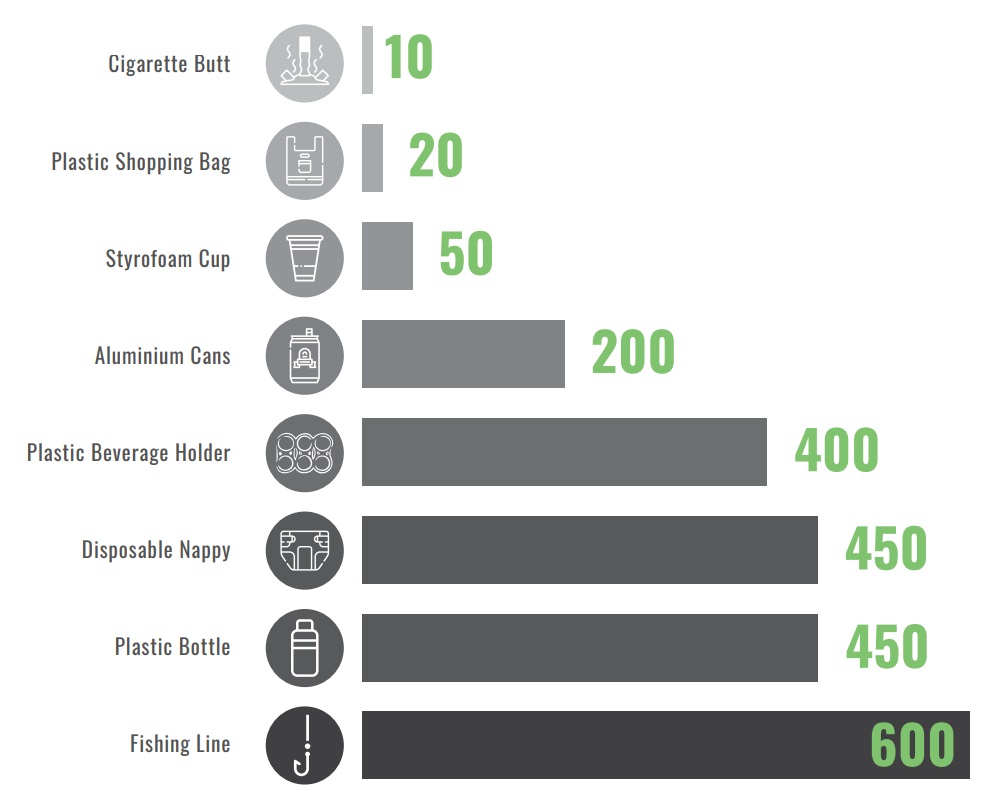
How much plastic is recycled?
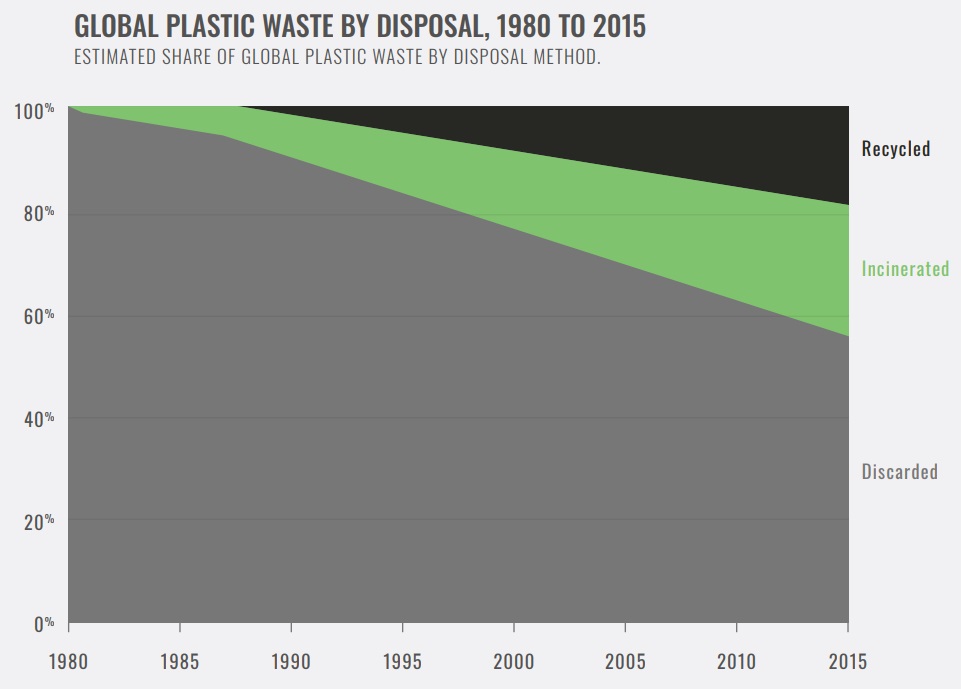
The amount of plastic being recycled is improving, but as of 2015, it is still a relatively small percentage compared to the levels of plastic that are incinerated or just discarded.
How much plastic do we produce?
The situation at hand is bleak. Plastic waste is on the increase, being led by an unfaltering increase in plastic production.
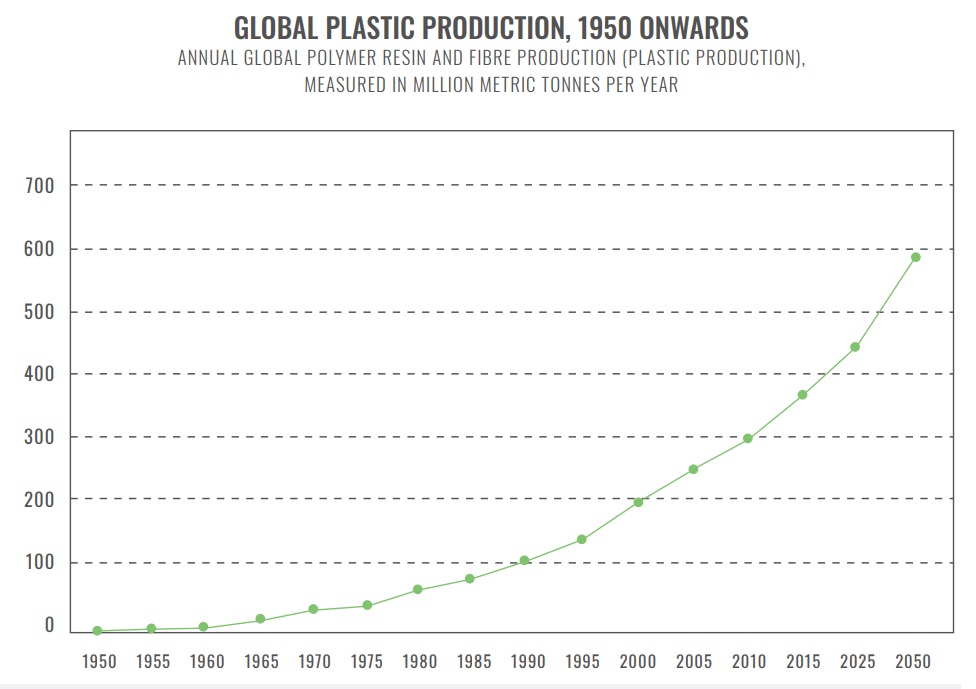
In 1950, 2 million tonnes of plastic were produced. If this continues at the same rate, predictions show that we are set to produce 590 million tonnes of plastic in 2050. By 2025, we’ll be using a staggering 445 million tonnes.
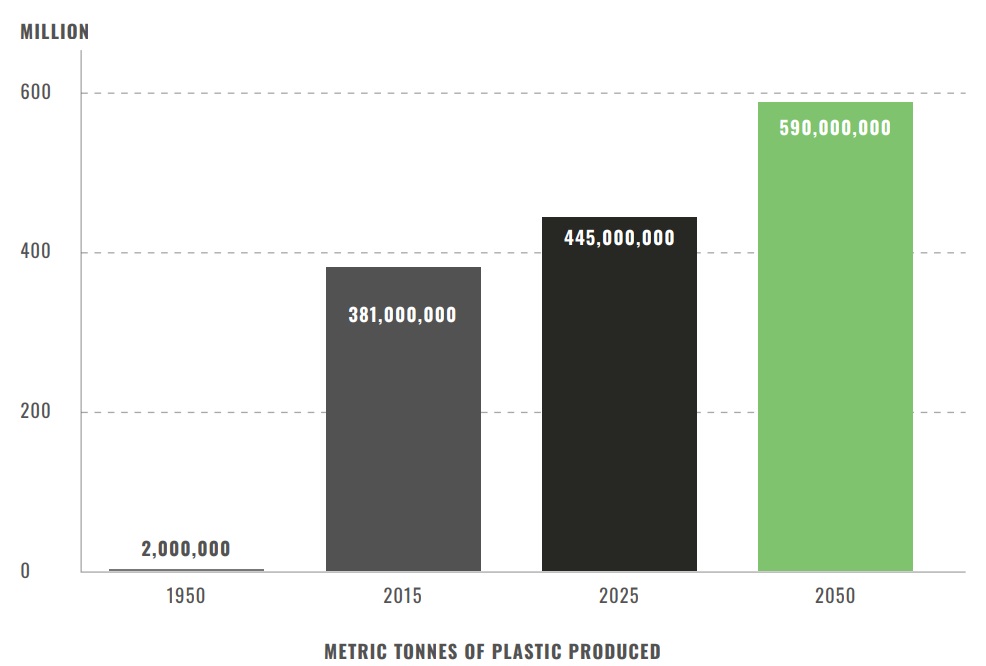
Where’s the demand coming from?
In Europe, the majority of our plastic consumption is from packaging, construction and other sources.
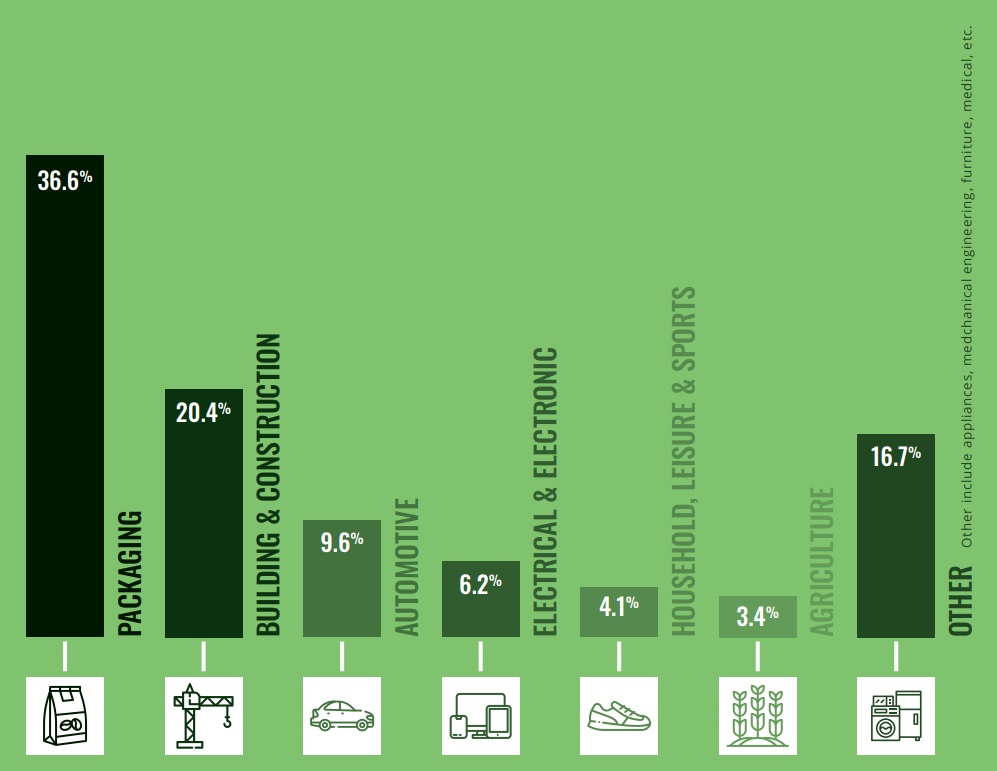
Which countries are polluting the oceans with plastic waste?
These countries are polluting the ocean with millions of metric tons of mismanaged plastic waste.
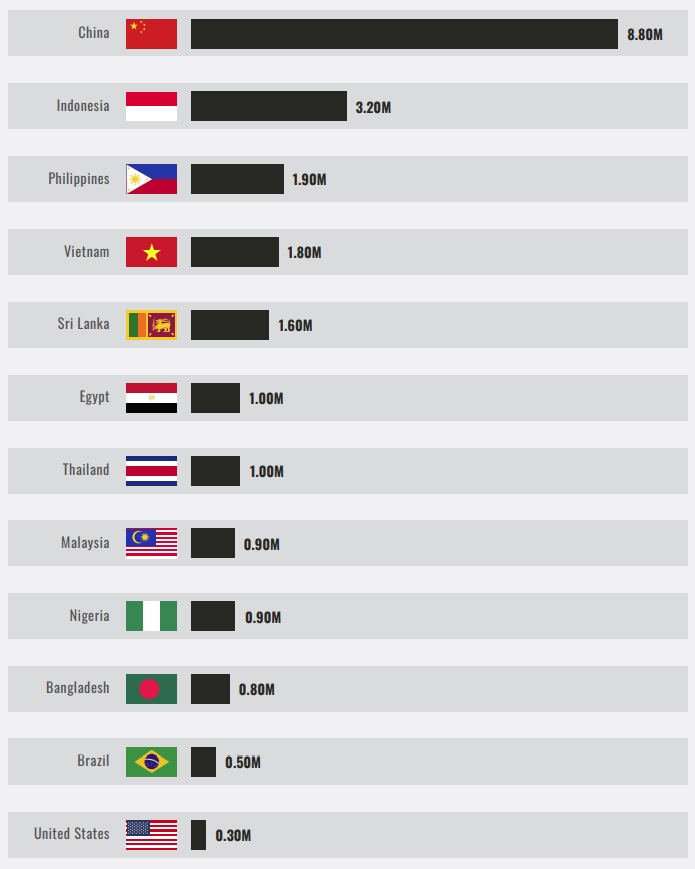
How plastic kills marine wildlife
Plastic waste which commonly ends up in the ocean takes hundreds of years to degrade. When it does, it leaves harmful microplastics.
- Plastic kills 100 million marine animals each year
- Each year, 12 – 14,000 tons are ingested by North Pacific fish
- It clogs the stomachs of marine animals, causing them to starve to death
- 90% of all seabirds have plastic in their stomachs
- There are now 500 uninhabitable marine dead zones
Marine plastic degrading rates
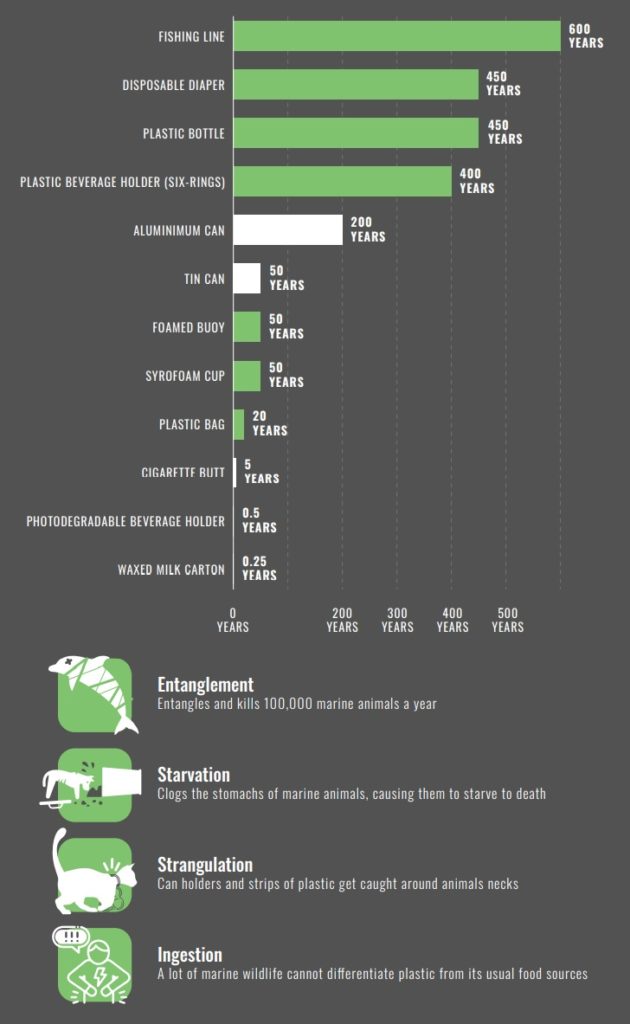
Your plastic consumption
We take everyday items for granted, which often means we overbuy and overuse them without a second thought. But every time you buy plastic, it adds up.
See how much plastic you could avoid using if you change your habits slightly.
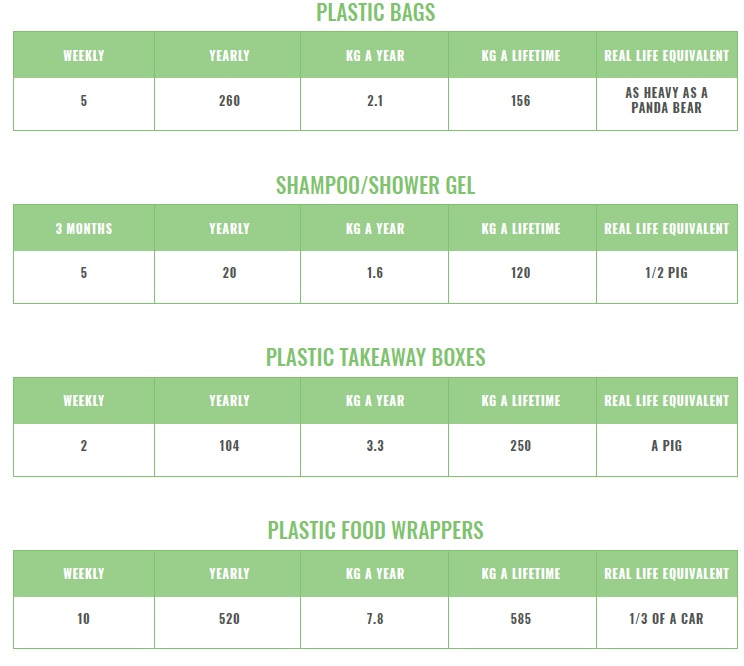
Every kilogram of plastic you use, especially if it is single use, contributes to environmental damage.
How we can do better
- Buy high quality goods – You may know the old saying, ‘buy it cheap, buy it twice’. If you’re in the financial position to, always chose high quality goods – a robust wooden furniture set will generally always last longer than a flimsy plastic alternative.
- Give up plastic bags – Since the UK government started the plastic bag charge scheme, the number of plastic bags issued by supermarkets has dropped by 95%.
- Leave single use plastics – Single use plastics are extremely damaging and produced in massive quantities, for example, 7% of the world’s plastic waste comes from plastic straws. They are now banned in the UK.
- Recycle – Recycling is easy when you get into the habit. UK households now successfully recycle 45.5% of their waste.
- Choose compostable or reusable packaging – Where possible, opt for paper bags or reusable packaging. Many supermarkets now encourage use of reusable net bags for loose fruit and veg instead of plastic.
- Grow your own food – The best way to reduce the amount of packaging you consume is to grow your own fruits and vegetables.
Businesses and supermarkets across the UK are making strides to change the way they issue plastic in stores. The number of plastic bags issued in supermarkets has reduced by a huge 95% since they started charging for them in 2014. Other schemes to reduce plastic are encouraged amongst supermarkets. This table shows that Waitrose has done the best in reducing and reusing plastic overall in 2021.
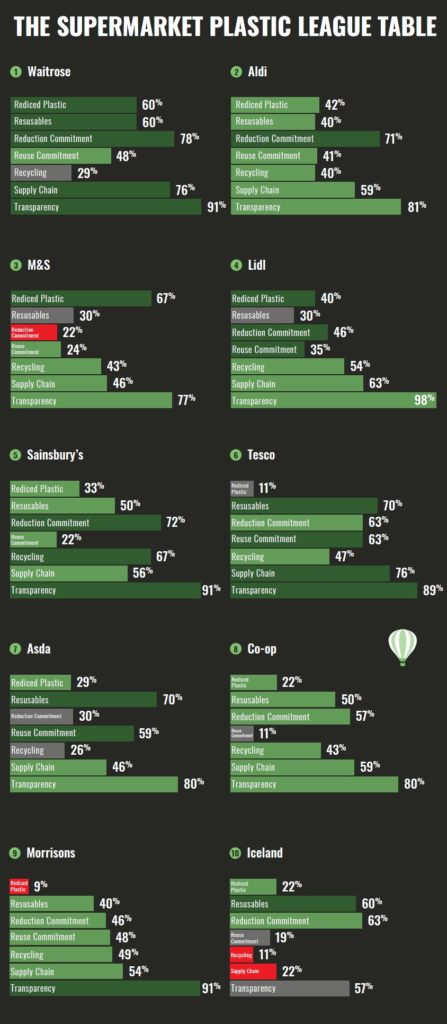
Sources
https://ourworldindata.org/plastic-pollution
https://www.statista.com/statistics/664906/plastics-production-volume-forecast-worldwide/
https://www.omnicalculator.com/ecology/plastic-footprint
https://www.plasticseurope.org/application/files/8016/1125/2189/AF_Plastics_the_facts-WEB-2020-ING_FINAL.pdf
https://www.weforum.org/agenda/2018/11/chart-of-the-day-this-is-how-long-everyday-plastic-items-last-in-the-ocean/
https://www.plasticethics.com/home/2019/3/17/the-countries-polluting-the-oceans-the-most-with-plastic-waste
https://www.condorferries.co.uk/marine-ocean-pollution-statistics-facts
https://www.gov.uk/government/publications/single-use-plastic-carrier-bags-why-were-introducing-the-charge/carrier-bags-why-theres-a-5p-charge
https://www.greenmatch.co.uk/blog/2018/09/plastic-straw-ban-uk
https://assets.publishing.service.gov.uk/government/uploads/system/uploads/attachment_data/file/966114/Statistics_on_waste_managed_by_local_authorities_in_England_in_2019v3_accessible.pdf
Ryan Jenkins is a professional gardener and has been working in the gardening industry for over 25 years. This has allowed Ryan to accumulate a vast wealth of gardening knowledge which he shares on the Sefton Meadows blog.



